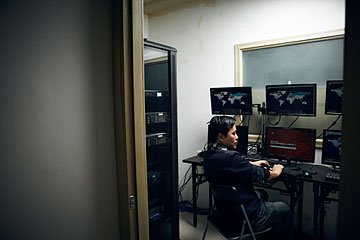
Wan now runs an IT company that helps other organizations defend against cyberattacks
(2 of 2)
Wan had the qualifications to enter prestigious Peking University to study history. But his family knew that particular academic department was one of the crucibles of the crushed student democracy movement. Instead, his parents instructed him to study at Beijing's Jiaotong University. The major forced upon him? Accounting. Wan found solace in the college's computer lab, where a primitive virus happened to be devastating hard drives. Wan was fascinated. "A virus was such a small thing, but it could have such power," he recalls. "I wanted my own power." In 1992, Wan designed his first virus and unleashed it. A few months later, his formatting virus had spread nationwide. Even his mother's office computer in Jiangxi was infected.
Hot Shot
After graduating from college in 1993, Wan worked for PricewaterhouseCoopers as an auditor. It was a decent job, but Wan nursed anger at his ideologically pliant parents and at a society he felt was "full of lies." He spent his nights on Internet bulletin-board systems — an exhilarating space where patriots expressed themselves freely. "I took my hatred of society and transferred it to Japan, to countries that were humiliating China," he says. "This was the only acceptable way to be angry in China." In 1997, on the 60th anniversary of Japan's brutal invasion of China, Wan says he flooded the Japanese Prime Minister's inbox, causing it to malfunction. The 1999 NATO bombing of China's embassy in Belgrade fired him up even more. Wan left a taunting note on a U.S. Army website. "I never stole information," he contends. "But I wanted to prove that China could compete with the West."
By the late '90s, Wan established his own IT company and began compromising the freedom he so cherished as part of the hackers' rebellious ethos. He helped the local Public Security Bureau monitor and censor Internet chat rooms. In 2000, he formed a club that would become the China Eagle Union. Patriotic businessmen donated cash for the hackers' online raids. "We thought it was our responsibility to defend China," he recalls.
Yet for a rebel who teethed on dissent in high school and reveled in the independence afforded by the Internet, Wan also realized he was being used by the state. Just as his hacking union was attracting more members — mostly male acolytes who followed him with the intensity of boy-band fans — he began questioning its mission. In 2005, anti-Japanese protests broke out again in China. This time, however, Beijing clamped down on the anti-Japanese fervor, lest it morph into a broader movement against the Chinese government. Once given free rein by the authorities to fulminate against foreigners, Wan was ordered by authorities to delete inflammatory content from his website.
The Chinese Internet is a different place from when Wan began hacking in the 1990s. Then, a computer was a rarity, one of the few ways for Chinese to reach out to the world and express their individuality. Now more than half a billion Chinese have Internet access — albeit in a censored form — and most are logged on to social media. While China's new leader Xi Jinping seems intent on harnessing nationalism for what he calls a "great renewal," the Chinese appear more preoccupied these days with domestic issues, like official graft, income inequality and environmental degradation. In recent months, online exposés have brought down a clutch of overfed, mistress-laden Communist Party officials. "The only way to solve China's problems is to face internal problems first and then external problems," says Wan. "We can't always blame outside forces." Today, he publicly disassociates himself from red hacking. "The most important thing about being a good hacker is being independent," says Wan. "If you do something for the government, you have lost a heart filled with freedom."
Some of China Eagle Union's original members are now successful businessmen who outgrew planting malware on foreign websites. Another is a waitress. But a number of Eagle's hackers met more complicated fates, especially when they fell prey to avarice. Several, admits Wan, were pressured to hack officially for the state after being caught doing something illegal online by Chinese cyberpolice. One took money from a Chinese state-owned enterprise that stole online data from a competitor. Little Dragon, one of Wan's closest friends, was sentenced to seven years in jail for endangering national security. Is Wan ever tempted to joust again with cyberwarriors across the globe? He shakes his head. Yet, he adds: "I'm still a hacker in spirit. I always will be."
Wan now runs an IT security company called Intelligence Defense Friends Laboratory, which counts top Chinese tech firms and NGOs among its clients. Half his employees, who crowd cubicles in an office on the fringes of Beijing, used to be members of China Eagle Union. One is Pei Weiwei, a 24-year-old who writes Internet security software and admits to having created a couple of computer viruses. (He says he has never released them.) Although Pei thrilled to the idea of being a hongke, he also knew the limits imposed by his nation's political system. "The culture and spirit of hackers can only develop well in a free environment," he says. "Chinese society doesn't tolerate unique people."
The only sign that Wan's office is not just another Chinese start-up comes from a closet-size lair accessed by a fingerprint sensor pad. Inside the darkened space, one screen churns out paragraphs of code. Another displays a world map dotted with red circles. Each circle, says Wan, represents a place being targeted by hackers. "It's like they're all shouting, Look at me!" says one of China's most notorious former red hackers, pointing to the flares of online espionage. "Don't worry, I'm watching you."
— with reporting by Chengcheng Jiang / Beijing
